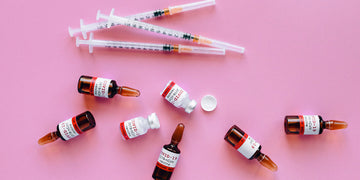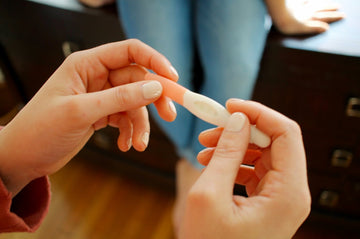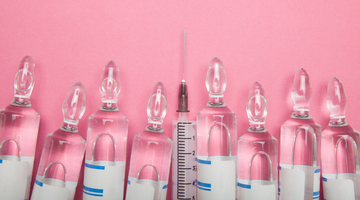Myth-busting: How does the COVID-19 vaccine affect fertility?

There is plenty of information going around about the COVID-19 vaccines and their effects on fertility, pregnancy, and the postpartum experience. While there is a lot still unknown about COVID-19, more reliable information is becoming available every day. With that, let’s debunk the myths vs. facts about the COVID-19 vaccinations and the vaccines affect on fertility.
Types of Vaccines
There are currently 3 COVID-19 vaccines approved by the FDA: Pfizer, Moderna, and Johnson & Johnson*. Both Moderna and Pfizer use a new technology called mRNA. Once it is injected into your arm, both vaccines give our cells instructions to make a harmless piece of protein that is similar to the one found on the surface of the Covid-19 virus. Once the protein piece is made, our immune cells recognize that it doesn’t belong, and start to build an immune response and make antibodies as if they were actually exposed to the virus. So, the mRNA vaccines teach our bodies to fight off the virus without ever actually exposing us to COVID-19. Since these types of vaccines don’t contain the virus, the CDC states that they are unlikely to present a specific risk for pregnant people.
The Johnson & Johnson vaccine is a viral vector vaccine in which a small amount of a modified version of a different virus (vector) is inserted into the arm. This vector sends instructions to your immune cells to produce a protein spike that our immune systems aren’t used to. Though the vector being injected is not the virus that causes COVID-19, it triggers the immune system to produce antibodies and fight what your body thinks is an infection. This teaches our bodies to protect us against future infection with the virus that does cause COVID-19.
* Important Editor's Note: As of August 11th, 2021, the CDC officially recommends that pregnant people and those who are trying to become pregnant take the COVID-19 vaccine. This endorsement comes after additional data showing no increased risk of miscarriage among those who took the vaccine while pregnant. This data is in line with earlier data showing similar results, and the CDC recommendation is also in line with the recommendation by the American College of Obstetricians and Gynecologists, which strongly recommends vaccines for people who are pregnant or are seeking to become pregnant.pregnancy-prep-combo
While results of vaccine trials are still pending, recent data shows that there is no increased risk of miscarriage among those who took the vaccine while pregnant. The vaccine also does not appear to have an impact on fertility: as of April 2021, 18 trial participants who received the vaccine got pregnant afterward, proving it is highly possible to get pregnant after receiving the vaccine. The mRNA vaccine is not thought to pose a threat to pregnancies as it is unlikely that any of the vaccine material will pass the placenta and reach the fetus. It’s also important to note that the mRNA vaccine does not contain the live virus and cannot give you COVID-19.
Other kinds of vaccines are generally safe during pregnancy, and are recommended. The immunity that vaccinations can give our bodies sometimes also provides benefits and protection to the growing baby. For example, you are urged during pregnancy to get the annual flu vaccine, as well as the Tdap vaccine. Other vaccines like the MMR vaccine should be taken a month or more before pregnancy or in the postpartum period. prenatal-multi-dha
There has been some speculation going around that there could be a link between the mRNA vaccine and infertility. When studying the effects of the COVID-19 vaccine on animals, it was not found to have any effect on fertility or the chances of getting pregnant. According to the CDC, there is no evidence that the COVID-19 vaccine causes infertility or interferes with placenta formation. In fact, 18 participants of the vaccination study became pregnant after receiving the COVID-19 vaccination.
In short, if you are concerned about the COVID-19 vaccine affecting your fertility, talk to your primary care provider or your OBGYN about your questions and concerns. There is no evidence that the vaccine has any effect on fertility or your ability to get pregnant in the future. pregnancy-tests
The Moderna and Pfizer COVID-19 vaccines can be offered to people who are pregnant or breastfeeding. Because these vaccines work by creating an immune response from the body without reproducing inside host cells, the vaccines don’t pose a risk for people who are breastfeeding or lactating, or the breastfeeding baby.
Getting vaccinated is a personal choice and one that’s best to make after learning about it from reliable trusted sources. At Winx Health (formerly known as Stix), we provide our community with information, products, and packaging you can trust. For more like this, head to Real Talk.
Keep Reading

How early can you take a pregnancy test?
Jun 20

The COVID-19 vaccine and pregnancy
Feb 15

When do I take a pregnancy test during my cycle?
Feb 17










